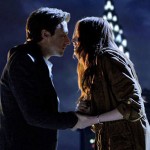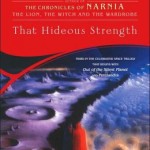Editor’s Note: November 22, 2013, will mark the fiftieth anniversary of C. S. Lewis’s death. On that day, he will be given a place in Westminster Abbey’s renowned Poet’s Corner. In commemoration of this event, all this week Christ and Pop Culture contributors will be writing about the works by C. S. Lewis that have been most personally significant to them.
Not many readers enjoy a chance to revisit a favorite author’s fantasy world as if for a second first time. But I count myself among those so blessed: After years repeatedly reading The Chronicles of Narnia, I finally discovered Lewis’s other fantasy series, the Ransom (or Space) Trilogy.
Here I was reading the famed fantasist out of order, for Lewis actually wrote these stories years earlier than Narnia. They were his first popular-level fiction works. And unlike Narnia’s straight-up fantasy “for children,” I found that Ransom blends several genres, with splendid and sometimes perplexing results—such as the pulp-style sci-fi with deep spiritual magic in Out of the Silent Planet or the stunning genre switch in That Hideous Strength to contemporary Earth among evil academics and (spoiler alert) a party-crashing Merlin, with animals and a Babel-like curse.
In between lies Perelandra, my favorite of the first two (if forced to choose). This story, named after the true “Old Solar” name of the planet Venus, brought me to a world much like Narnia, and again for return visits as I kept diving deep into this paradise.
Unlike an Eden-like fruit that the hero, Ransom, tastes on a floating island, Perelandra’s pleasures can be repeated to great effect. Even now I am inclined, like Ransom, to rhapsodize about this wholly imaginary — so far? — world orbiting our sun. Without talking animals or many humans, Perelandra is a truly virginal realm, wrapping an unclothed Ransom in its embrace of warm oceans and sensuous floating islands.
Perelandra fleshes out themes found in Silent Planet’s closing chapters, when Ransom’s former captor Weston outlines classic humanist notions of colonialism that, as the planet’s angelic guardian concludes, values abstract “mankind” over actual men. Ransom translates this for an angelic listener who only faintly fathoms the notion of “bad,” and in Perelandra, Lewis expands this idea into several chapters. Here, Ransom becomes a third player in a redux of Satan’s temptation of Eve. Outmatched by the Un-Man himself in human (Weston) form, our hero is himself challenged by tactics never recorded in Genesis 3 but which could have been in the Serpent’s backup plan had Eve initially refused.
These scenes are the heart of Perelandra, and surely they express Lewis’s own views of evil and truth. His fantasy tempter is realistically persuasive beyond the pages — from insisting that God only gives His commands so people can find maturity in disobedience, to brazenly citing a variation of “what men meant for evil God means for good,” to proffering a “lesser” temptation of not actually defying God’s only edict, but only imagining this sinful action.
“He has never forbidden you to think about it,” the Un-Man suggests. “Might not that be one of the reasons why you are forbidden to do it — so that you may have a Might Be to think about, to make Story about as we call it?” I read this and shudder, and Lewis must have done the same at least once, for it’s a meta-question about how we may abuse stories to commit our own sins.
If, God forbid, Narnia for you carries any form of “just stories for children” stigma, well, you’d be wrong — but you wouldn’t be wrong to start with Lewis’s earliest novels of a spiritual solar system married to pulp sci-fi and fantasy.
Once Lewis wrote of his friend J.R.R. Tolkien’s high fantasy: “Here are beauties which pierce like swords or burn like cold iron.” This is also true of Perelandra. It makes me long for our own paradise restored.
Photo via Barnes and Noble.











